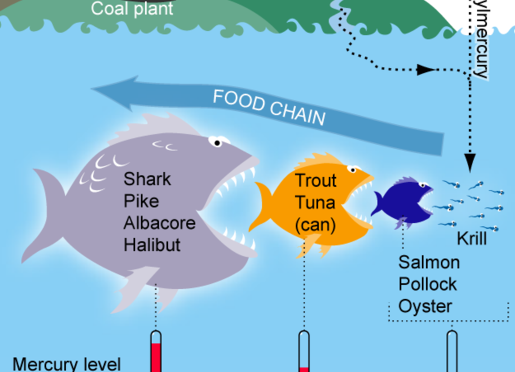Environmental contaminants, such as bisphenol-A (BPA), endocrine disrupting compounds (EDCs), other plastic-originating compounds, and persistent organic pollutants in general, are widespread in our environment and also in the foods that we eat on a daily basis. There
![Photo By Bretwood Higman, Ground Truth Trekking. [CC BY 3.0 (http://creativecommons.org/licenses/by/3.0)], via Wikimedia Commons](http://french-paradox.net/wp-content/uploads/2015/01/MercuryFoodChain-01_french_paradox-258x300.png)
For more on the harm BPA and other EDCs cause on the environment and on your health, please visit stealthepidemic.com, a website founded by Lewis Perdue and Becca Yeamans-Irwin (the co-editors of the French Paradox site).
Other sources of environmental contaminants are known to come from the food chain, like mercury in fish and pesticides in various fruits and vegetables.
A new study looked at the associations, if any, between environmental contaminants circulating in the human body and diet type. Could eating a certain type of diet reduce the levels of harmful environmental contaminants in the body? Or does diet not affect these levels in the blood?



![Photo by juliegomoll (Grocery shopping at the HyperMart in Cairo) [CC BY 2.0 (http://creativecommons.org/licenses/by/2.0)], via Wikimedia Commons](http://french-paradox.net/wp-content/uploads/2014/12/olives_Spinneys_HyperMarket_grocery_Cairo_french-paradox-300x225.jpg)

![Photo by Rannpháirtí anaithnid, spitzl (Own work) [CC BY-SA 3.0 (http://creativecommons.org/licenses/by-sa/3.0) or GFDL (http://www.gnu.org/copyleft/fdl.html)], via Wikimedia Commons](http://french-paradox.net/wp-content/uploads/2014/12/Piiggs_surplus_2002-2009_french-paradox-230x300.png)


![Photo By Brittany Carlson (USAG Stuttgart) (United States Army) [Public domain], via Wikimedia Commons](http://french-paradox.net/wp-content/uploads/2014/12/children_eating_healthy_french_paradox-300x199.jpg)